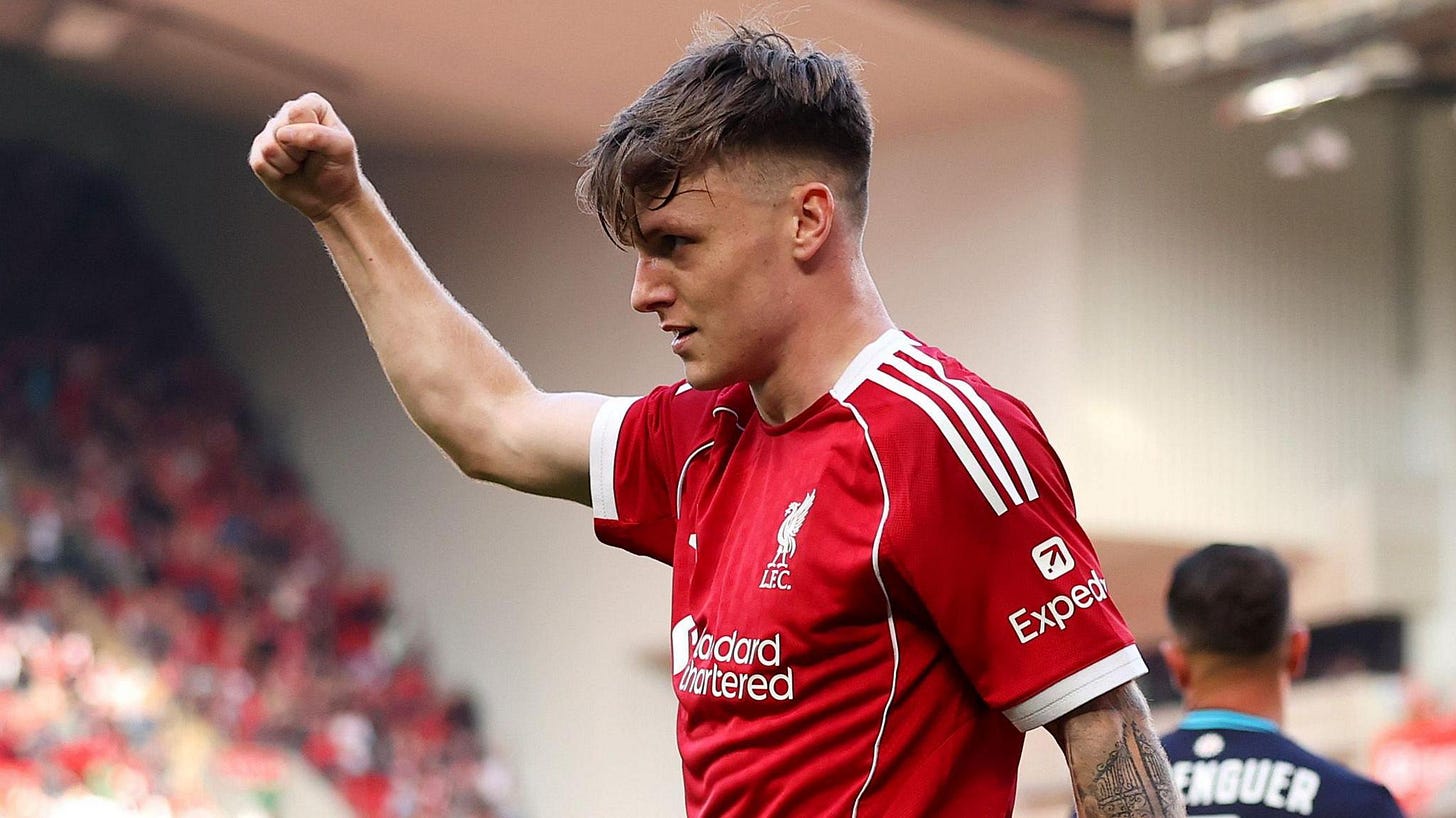Ben Doak Departs: What His £25 Million Sale Means for Liverpool’s Summer Strategy
The teenager’s move to Bournemouth reflects more than a sale, it reveals how Liverpool are funding a new era while keeping one eye on future talent.
At just 19, the Scotland winger leaves for Bournemouth, but Liverpool’s decision reflects a bigger picture of finance, ambition, and faith in the long-term model
There are certain transfers that stop you for a moment, not because of the size of the fee or the name involved, but because of what they represent. Ben Doak’s move from Liverpool to Bournemouth for £25 million falls neatly into that category. At 19 years of age, the Scotland international looked like a footballer with his best years ahead of him. His fearless dribbling, bursts of pace, and flashes of raw talent had drawn excitement from supporters who love nothing more than seeing a young player take on his man in front of the Kop. Yet on Monday the news became official. Doak is no longer a Liverpool player, at least not for now.
The deal, however, comes with a crucial clause. Liverpool have retained a buy-back option, which effectively means they can re-sign Doak at a fixed price should he explode into the star many predict. It softens the blow, but it also underlines what this transfer window has been about for Liverpool: strategy, balance sheets, and positioning for the future.
The Rise of Ben Doak
Doak joined Liverpool from Celtic as a highly regarded teenager, making his first team debut at 17. There was something exhilarating about watching him charge down the right wing with little fear of who stood in his way. In an era where young players often seem overly coached, his play carried a sense of freedom and unpredictability. The comparisons with a young Raheem Sterling or even Michael Owen in his early days at Anfield were not entirely misplaced.
Last season, he made cameos in both domestic competitions and Europe, though injuries limited his rhythm. Supporters saw enough to be intrigued, but at a club where competition for places is relentless, the pathway to regular minutes was never straightforward. With Mohamed Salah still the figurehead on the right and the likes of Chiesa, Wirtz, and Ekitike joining the attack this summer, the squeeze became even tighter.
Why Sell Now?
The £25 million fee immediately jumps out. For a player with under 20 senior appearances, it represents an enormous return on investment. Liverpool had signed Doak for a modest fee from Celtic, developed him within their system, and now banked a substantial sum to recycle back into the squad.
It is not the first time Liverpool have used this method. The sales of players like Rhian Brewster, Dominic Solanke, and Jordon Ibe in years gone by followed a similar pattern. The club identify talent, nurture it to a level that attracts strong offers, then sell at the right time to fund wider priorities. This summer, with the arrival of Florian Wirtz for a record fee and continued pursuit of Alexander Isak, every penny matters under financial regulations. Doak’s sale fits perfectly into that wider picture.
The Safety Net of the Buy-Back
What makes this case particularly interesting is the buy-back clause. Liverpool have not closed the door on Doak, far from it. Instead, they have effectively outsourced his development to Bournemouth, a club that will likely hand him the regular Premier League minutes he could not have found at Anfield. If he flourishes, Liverpool can bring him back. If not, they will still have benefitted financially.
From the club’s perspective, it looks like smart business. From a supporter’s perspective, it can feel bittersweet. Fans wanted to see how far Doak could go in red. There was a romance to the idea of the teenager galloping down the wing at Anfield for years to come. Yet modern football rarely deals in romance alone.
The Financial Model in Motion
Liverpool’s transfer window has been one of calculated aggression. The sale of Trent Alexander-Arnold, Darwin Nunez and Luis Diaz have departed. On the incoming side, the arrivals of Wirtz, Frimpong, Kerkez, and Ekitike have shown ambition. It is a squad being reshaped quickly, with an eye on winning now and building for the next five years.
Doak’s exit plays into this broader theme. Rather than holding onto every young talent, Liverpool are showing a willingness to trade. This is the model: buy or produce promising players, sell for profit, reinvest in elite signings, and keep the cycle turning. It is a method that requires discipline and timing. It also relies on the strength of the recruitment department to ensure the money is reinvested wisely.
Bournemouth’s Gain, Liverpool’s Gamble
For Bournemouth, Doak is an exciting coup. They have invested heavily in recent years to establish themselves as a stable Premier League side, and signing a young winger with potential star quality fits their profile perfectly. He will likely get the game time he craves, and for Scotland it may also prove a blessing as he builds towards a more prominent role at international level.
For Liverpool, it is a gamble of sorts. There is always the chance that Doak blossoms into a superstar elsewhere and that the fee, however substantial, looks small in hindsight. The buy-back clause guards against that, but football is rarely so straightforward. Circumstances change, squads evolve, and sometimes players do not return.
What It Says About Faith in Youth
One of the interesting side stories here is what this means for Liverpool’s academy. In recent years, names like Conor Bradley, Kaide Gordon, and Luke Chambers have emerged with varying degrees of opportunity. Doak felt like the next big hope. His departure does not mean the club have abandoned youth, but it does show they are selective in where they see a pathway. Arne Slot is focused on balancing immediate results with long-term sustainability. Not every prospect will get the chance to make it at Anfield, especially with the stakes so high in the Premier League and Champions League.
Conclusion
Ben Doak’s £25 million departure is not just a transfer story, it is a statement about where Liverpool are and where they are heading. The club have banked a huge profit, kept a buy-back option, and demonstrated that they are willing to make difficult decisions in pursuit of their broader strategy. For Doak, it is an opportunity to play regular football and to prove himself at the highest level.
For supporters, it is a moment tinged with regret but also with understanding. Liverpool are building something big under Arne Slot, and sacrifices are part of that journey. The hope will be that Doak thrives, whether in Bournemouth colours or, one day, once again in the famous red shirt.



